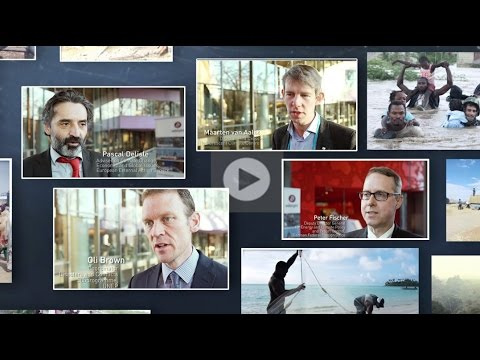Climate change is again among the top-ranked risks threatening societies, economies and international peace and security. There is emerging consensus that global governance actors have to find integrated responses and consider climate change impacts throughout the process of policy making, as well as in the field.
The interviews have been conducted at the Planetary Security Conference in The Hague, 5-6 December 2016.
Oli Brown/UNEP:
“UN Environment tries to be the voice of the environment in the United Nations system and the core role of the UN system is the preservation of international peace and security. We see our role as identifying core environmental risks as they relate to peace and security. We don’t get involved in conflict prevention, conflict mediation ourselves but we try and work with the bits of the UN that are responsible for identifying, preventing and resolving conflict. We try to encourage organs like the UN Security Council, the UN General Assembly and other parts of the UN to really think about how climate change can play a role in international peace and security and what we can do to resolve some of the core issues that climate change is creating in terms of peace and security. So that involves working with entities as the Peacebuilding Support, the Department for Peacekeeping Operations, to think about how they can integrate climate approaches more effectively into their work.”
Maarten van Aalst/RCRC:
“The way we confront these risks is really not that different from how we would have confronted these risks in the past. So it is basically strengthening community resilience, it is helping communities resolve local conflicts. And in the end, strengthening societies not just by large-scale infrastructure at the national scale to deal with these abstract long-term changing risks but particularly strengthening communities locally.”
Pascal Delisle/EEAS:
“And as you know, many of our member states are very worried about the implications in terms of migration. So for the EU it is a question of connecting the dots, we have got a lot of tools already available, we work on humanitarian affairs – our Directorate-General ECHO is extremely good at assessing risk and proposing response measures, our development cooperation is also working on a longer term - addressing and mainstreaming climate change in all of its planning. And at the same time, the EEAS, coming from a conflict perspective, is integrating climate change as an element of instability and risk in its assessments. I think there is a lot of progress. It is still an impressionist painting. We have got pieces and bits and touches of colour being connected more and more. And I think behind that, the Global Strategy that Ms. Mogherini released in June 2016 provides a blueprint for integrating these different elements: climate, security but also implementation of Paris.”
Peter Fischer/G7 and G20:
“We have a G7 working group on climate and fragility, it is the G7 foreign ministries that operate this group and we started this process in 2013 already and in 2015/2016 we delivered a report to the G7 foreign ministers on the nexus between climate, fragility, stability, and security and the report says clearly that there is a nexus, that climate change is a risk multiplier. […] On the energy and climate front we would like to make sure that the G20 plays an active role in delivering the SDGs and the Paris Agreement. We want a more coherent approach in the G20 to energy and climate policy. So far there is an energy sustainability working group and a climate sustainability working group under the G20. We want them also to meet together and to deliver to the heads of state and government a ‘G20 Energy and Climate Action Plan’ that has to do with long term decarbonisation plans, helping to deliver the Paris Agreement in connection with other countries, for example the so called NDCs, nationally determined contributions, and a number of other very interesting initiatives.”










